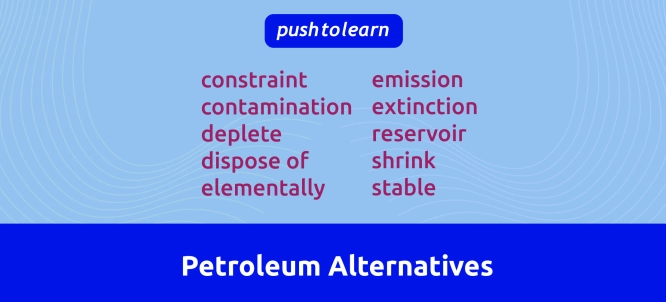by PushtoLearn
Petroleum Alternatives
Table of Contents
Petroleum Alternatives Flashcards - Vocabulary Practice for TOEFL
These exercises focus on Petroleum Alternatives Vocabulary
Vocabulary List for Petroleum Alternatives
-
Constraint (n.)
Definition: A limitation or restriction that prevents something from happening freely.
Example: "High production costs are a constraint on the widespread adoption of solar energy."
Explanation: Constraints can slow or limit the use of alternative energy, making it more challenging to replace petroleum-based fuels. -
Contamination (n.)
Definition: The presence of harmful or unwanted substances that make something less pure or safe.
Example: "Oil spills cause contamination of ocean ecosystems, harming marine life."
Explanation: Contamination occurs when pollutants enter the environment, reducing its quality and threatening human and ecological health. -
Deplete (v.)
Definition: To reduce or use up the supply of something.
Example: "Continuous drilling will eventually deplete the world’s petroleum reserves."
Explanation: Nonrenewable resources like petroleum can be depleted over time, motivating the search for renewable alternatives. -
Dispose of (phr. v.)
Definition: To get rid of something that is no longer needed or wanted.
Example: "New techniques to dispose of biofuel waste help prevent environmental damage."
Explanation: Proper disposal of byproducts from alternative energy sources ensures sustainability and reduces pollution. -
Elementally (adv.)
Definition: In terms of the basic or fundamental nature of something; essentially.
Example: "Elementally, wind power relies on the natural movement of air currents."
Explanation: Understanding energy sources elementally means focusing on their core principles and how they fundamentally work. -
Emission (n.)
Definition: The act of releasing something, often gas or radiation, into the atmosphere.
Example: "Reducing carbon emissions is a central goal of clean energy initiatives."
Explanation: Emissions from burning fossil fuels contribute to climate change, making clean, low-emission alternatives increasingly important. -
Extinction (n.)
Definition: The dying out of a species so that no more members of it exist.
Example: "Oil pollution pushes some marine species closer to extinction."
Explanation: Environmental damage from fossil fuels can drive species to extinction, highlighting the need for sustainable energy solutions. -
Reservoir (n.)
Definition: A large, stored supply of something, often water or oil.
Example: "Geothermal energy taps into the Earth’s heat reservoir for a steady power supply."
Explanation: While petroleum comes from underground reservoirs, renewable sources use reservoirs of natural forces like wind, sun, or Earth’s heat. -
Shrink (v.)
Definition: To become smaller in size, amount, or value.
Example: "As fossil fuel reserves shrink, investment in renewable energy technologies grows."
Explanation: Declining petroleum supplies encourage the development and adoption of energy alternatives. -
Stable (adj.)
Definition: Not likely to change or fail; firmly established and secure.
Example: "Solar power prices have become stable, making it a reliable long-term energy option."
Explanation: A stable energy source doesn’t face the dramatic price swings or supply issues that often affect petroleum.

Summary Table
|
Word |
Definition |
Example |
|
Constraint |
A limitation or restriction |
"Costs are a constraint on solar adoption." |
|
Contamination |
Presence of harmful substances |
"Oil spills cause contamination of oceans." |
|
Deplete |
To reduce or use up completely |
"Drilling depletes oil reserves." |
|
Dispose of |
To get rid of something |
"They safely dispose of biofuel waste." |
|
Elementally |
Essentially, at the most basic level |
"Elementally, wind power relies on air currents." |
|
Emission |
The release of gases or substances |
"Reducing emissions is a key goal." |
|
Extinction |
The dying out of a species |
"Oil pollution may cause extinction of some fish." |
|
Reservoir |
A large stored supply |
"We tap into Earth’s geothermal reservoir." |
|
Shrink |
To become smaller |
"Oil reserves shrink over time." |
|
Stable |
Steady and secure |
"Solar prices are stable." |
Examples in Context
-
Constraint: "Strict environmental regulations serve as a constraint on the expansion of coal-fired power plants."
-
Contamination: "Improper disposal of battery materials leads to contamination of soil and groundwater."
-
Deplete: "Relying solely on fossil fuels will deplete them faster than we can find alternatives."
-
Dispose of: "Engineers are researching better ways to dispose of old solar panels safely."
-
Elementally: "Elementally, biomass energy comes from organic materials like wood and crop waste."
-
Emission: "Switching to electric vehicles lowers greenhouse gas emissions."
-
Extinction: "Habitat destruction from oil exploration pushes rare species closer to extinction."
-
Reservoir: "A reservoir of underground steam can be used to generate clean electricity."
-
Shrink: "As the cost of wind turbines continues to shrink, more countries adopt wind power."
-
Stable: "Stable sources of energy, such as geothermal, help reduce dependence on imported oil."
FAQ About the Petroleum Alternatives Vocabulary Module
How can I remember these vocabulary words related to petroleum alternatives?
Connect each word with real-world examples you find in articles, documentaries, or news stories about sustainable energy. Creating flashcards and using the words in your own sentences can also help reinforce your memory.
Is there a difference between “deplete” and “shrink”?
Yes. Both refer to a reduction, but “deplete” often implies using something up until it is nearly gone, while “shrink” can mean a general decrease in size, amount, or value, not necessarily complete usage.
Can “contamination” apply to areas other than the environment?
Yes. While contamination is commonly used for environmental pollution, it can refer to any situation where something pure or safe is made impure, such as contaminated food or a contaminated data source.
Why is “emission” important in discussions about petroleum alternatives?
“Emission” is crucial because one main goal of seeking petroleum alternatives is to reduce harmful emissions, like carbon dioxide and other greenhouse gases, that contribute to climate change.
How do I use “elementally” in everyday conversation?
“Elementally” is more academic or formal. You might use it when breaking down a topic to its fundamental essence, for example: “Elementally, clean energy is about harnessing natural, renewable sources rather than burning fossil fuels.”

